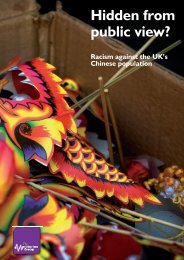Coming of Age : 1976 and the Road to Anti-Racism
Coming of Age : 1976 and the Road to Anti-Racism by Jagdish Patel and Suresh Grover
Coming of Age : 1976 and the Road to Anti-Racism
by Jagdish Patel and Suresh Grover
Create successful ePaper yourself
Turn your PDF publications into a flip-book with our unique Google optimized e-Paper software.
<strong>the</strong> class struggle itself. They had <strong>to</strong> fight simultaneously as a people <strong>and</strong> as a class – as black <strong>and</strong> as workers – not<br />
by subsuming <strong>the</strong> race struggles <strong>to</strong> <strong>the</strong> class struggle but by deepening <strong>and</strong> broadening class struggle through<br />
its black <strong>and</strong> anti-colonial, anti-imperialist dimension. The struggle against racism was a struggle for <strong>the</strong> class.<br />
A series <strong>of</strong> strikes in <strong>the</strong> early 1970s in <strong>the</strong> textile <strong>and</strong> allied industries in <strong>the</strong> East Midl<strong>and</strong>s <strong>and</strong> in various fac<strong>to</strong>ries in<br />
London illustrate <strong>the</strong>se developments. In May 1972 Pakistani workers in Crepe Sizes in Nottingham went on strike over<br />
working conditions, redundancies <strong>and</strong> pay. They composed <strong>the</strong> lowliest two-thirds <strong>of</strong> <strong>the</strong> workforce. were subjected<br />
<strong>to</strong> constant racial abuse by <strong>the</strong> white foreman <strong>and</strong> worked, without adequate safety precautions <strong>and</strong> <strong>to</strong>ilet <strong>and</strong> canteen<br />
facilities, an eighty four-hour week for £40.08. And yet five <strong>of</strong> <strong>the</strong>ir number had been made redundant — after<br />
<strong>the</strong> workers had joined <strong>the</strong> Transport <strong>and</strong> General Workers’ Union (TGWU). There was no <strong>of</strong>ficial support from <strong>the</strong><br />
union, however, till a Solidarity Committee composed <strong>of</strong> <strong>the</strong> wives <strong>and</strong> families <strong>of</strong> <strong>the</strong> strikers <strong>and</strong> <strong>of</strong> o<strong>the</strong>r Asian workers,<br />
community organisations <strong>and</strong> <strong>the</strong> Nottingham-based BPFM forced <strong>the</strong> TGWU <strong>to</strong> act. In June <strong>the</strong> management<br />
capitulated, agreeing <strong>to</strong> union recognition <strong>and</strong> <strong>the</strong> re-instatement <strong>of</strong> <strong>the</strong> workers who had been made redundant.<br />
The strike <strong>of</strong> Indian workers at Mansfield Hosiery Mills in Loughborough in Oc<strong>to</strong>ber 1972 was for higher wages <strong>and</strong><br />
against <strong>the</strong> denial <strong>of</strong> promotion <strong>to</strong> jobs reserved for whites. The white workers went along with <strong>the</strong> wages claim<br />
but not promotion. <strong>and</strong> <strong>the</strong> union, <strong>the</strong> National Union <strong>of</strong> Hosiery <strong>and</strong> Knitwear Workers, first prevaricated <strong>and</strong> <strong>the</strong>n<br />
decided (after <strong>the</strong> strikers had occupied <strong>the</strong> union <strong>of</strong>fices) <strong>to</strong> make <strong>the</strong> strike <strong>of</strong>ficial, but not <strong>to</strong> call out <strong>the</strong> white<br />
workers. Once again, community associations, Asian workers at ano<strong>the</strong>r company fac<strong>to</strong>ry <strong>and</strong> political organisations<br />
like <strong>the</strong> BPFM <strong>and</strong> <strong>the</strong> BWM provided, in <strong>the</strong> Mansfield Hosiery Strike Committee, <strong>the</strong> basis for struggle.<br />
So that when strikes by Asian workers at <strong>the</strong> Courtauld owned Harwood Cash Lawn Mills in Mansfield <strong>and</strong> E.E.<br />
Jaffe <strong>and</strong> Malmic Lace in Nottingham broke out in <strong>the</strong> middle <strong>of</strong> 1973, <strong>the</strong> Mansfield Hosiery Strike Committee<br />
was at h<strong>and</strong> <strong>to</strong> give <strong>the</strong>m support. More importantly - from a long-term view - <strong>the</strong> Strike Committee, pursuing<br />
its policy <strong>of</strong> pushing <strong>the</strong> trade union movement <strong>to</strong> fight racism not just in word but in deed, now called<br />
for a Conference <strong>of</strong> Trade Unions against Racialism. Accordingly, in June 1973 350 delegates from all <strong>the</strong> major<br />
unions <strong>and</strong> representatives from black community groups <strong>and</strong> black organisations came <strong>to</strong>ge<strong>the</strong>r at a conference<br />
in Digbeth Hall, Birmingham. From this emerged <strong>the</strong> Birmingham Conference Steering Committee,<br />
which in turn led <strong>to</strong> <strong>the</strong> setting up <strong>of</strong> <strong>the</strong> National Committee for Trade Unions against Racialism (NCTUAR).<br />
Meanwhile, in <strong>the</strong> London area in June 1972, West Indian workers at Stanmore Engineering Works struck work dem<strong>and</strong>ing<br />
wage increases recommended by <strong>the</strong>ir union, <strong>the</strong> Amalgamated Union <strong>of</strong> Engineering Workers (AUEW).<br />
They went fur<strong>the</strong>r, <strong>the</strong>y staged a sit-in. But although <strong>the</strong> union was prepared <strong>to</strong> award strike pay, it was not prepared<br />
<strong>to</strong> bring its national weight <strong>to</strong> bear on <strong>the</strong> strike — by, for instance, getting workers <strong>and</strong> unions in <strong>the</strong> mo<strong>to</strong>r industry <strong>to</strong><br />
‘black’ products from Stanmore Engineering. The strikers were eventually removed by a court injunction <strong>and</strong> sacked.<br />
Trade union racism showed up again a year later in <strong>the</strong> strike at St<strong>and</strong>ard Telephone <strong>and</strong> Cables (New Southgate),<br />
a subsidiary <strong>of</strong> ITT, over promotion <strong>of</strong> West Indians <strong>to</strong> ‘white only jobs’. The craft unions, like <strong>the</strong> Metal Mechanics,<br />
remained stubbornly craft/race oriented. The Electrical Trades Union (ETU) opposed <strong>the</strong> strike as detrimental <strong>to</strong> its<br />
(white) members, in<strong>to</strong> whose ranks blacks sought promotion. The local AUEW shop steward, though supporting <strong>the</strong><br />
strikers, could not get <strong>the</strong> support <strong>of</strong> his union on a national basis. The NCTUAR called on <strong>the</strong> trade unions <strong>and</strong> trade<br />
56 | <strong>Coming</strong> <strong>of</strong> <strong>Age</strong><br />
<strong>Coming</strong> <strong>of</strong> <strong>Age</strong> Final version 16.10.indd 56 17/10/2017 12:07







